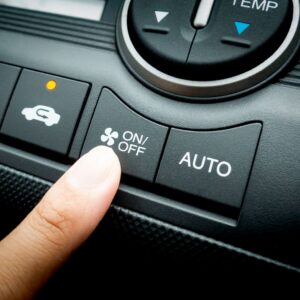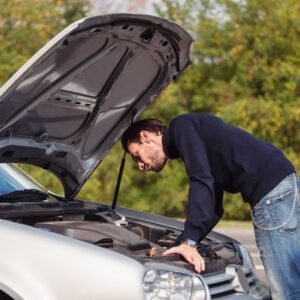Don’t ignore unusual sounds like rattling noises from your car. They can point to a wide variety of issues, from a loose screw to a faulty component. Whether you hear rattling while you’re parked or driving, it’s best to trace where it’s coming from and determine how to resolve it.
Why Is My Car Making a Rattling Noise When Parked?
One reason why your car makes a rattling noise when parked is because there are issues with components like the belt tensioner and A/C compressor clutch. There might also be problems with engine-related parts, like the heat shield and exhaust pipes.

The sound usually comes from under the hood or car, depending on the affected part.
Why Is Car Making a Rattling Noise When Accelerating?
If you hear a rattling noise when you press the gas pedal, you might be dealing with damaged or worn-out components. Scenarios like low engine oil levels could also be the culprit.
Determine where the sound is coming from. In some cases, getting rid of the rattling noise might be as simple as removing the loose coins in your glove compartment.
Possible Causes of the Rattling Noise Based on Location
How to get rid of the rattling noise depends on what’s causing it. The first step is to follow your ears and determine if it’s coming from inside the car, underneath the car, or under the hood.
Inside the Car
Check the components in the general area where the sound is coming from. For good measure, inspect the areas with space like the glove compartment, cup holders, and car seats. Examine the window seals and the trunk or cargo area as well.
Cluttered Space
Any place that can hold an item, no matter how small, is worth checking. From the cup holders to the glove box, check the space for anything that could cause a rattling noise, especially when the car is moving.
Look for loose coins, pens, and similar items. Some of them could be loose, hence the sound. Likewise, make sure the glove compartment and the center console are both screwed in tightly.
Loose Cargo
The same principle applies to the trunk and cargo, as items could move around while you’re driving. Depending on their material or what they contain, they might make rattling noises when accelerating.
In most cases, securing the item so it doesn’t move around would get rid of the noise.
Bad Window Seals
A deteriorated window seal can’t keep the window secure, causing it to shake and rattle when the car is moving. Not only that, but a damaged seal could also let dirt and water in.
Luckily you can replace the seal yourself or have a mechanic do it for you. The process usually involves removing the existing rubber, cleaning and sanding the area, and installing the replacement seal.

Under the Car
If you trace the rattling noise under the car, check the components there. This includes inspecting the heat shield, brackets, exhaust system, catalytic converter, and suspension or steering components.
Rusty Heat Shield
The heat shield isolates the engine block to prevent it from overheating. Unfortunately, it’s prone to wear and tear, particularly corrosion.
Once the heat shield starts to rust, it makes a rattling noise. When this happens, you’ll need a new shield to replace the corroded one.
Faulty Brackets
Brackets support load for heavy vehicles. Because of this, they tend to wear out over time, causing some components to move around and make a rattling noise.
The best course of action is to replace or repair the brackets once they reach the end of their lifespan.
Malfunctioning Exhaust System
Leaks inside the exhaust system might also result in a rattling noise. Not only that, but a damaged exhaust system can cause hazardous fumes to leak inside the vehicle. As such, it’s best to take your car to a mechanic to have it inspected.
Bad Catalytic Converter
The catalytic converter can make rattling noises when it’s damaged to the point that some of its parts have fallen apart and are cluttering around. Failure to resolve this issue can result in failed emissions tests because the converter is responsible for removing pollutants from the engine.
Worn Suspension and Steering Components
Similarly, components in the suspension and steering system could wear and cause the rattling noise. Parts like the control arm bushings, tie rods, ball joints, sway bar link ends, springs, struts, strut tops, or shocks can cause strange sounds when they are worn out.
When they’re to blame, you’ll notice the noise more as you go over bumps or corners. It’s best to replace the affected parts, as the suspension and steering system are crucial to maintaining proper control over your vehicle.
Under the Hood
If the sound is coming from under the hood, check the hydraulic valve lifter, pistons, and engine oil level for problems.
Faulty Hydraulic Valve Lifter
When the hydraulic valve lifter is faulty, there might be a problem with the rocker arm, valve tip, and/or push rod, which could make a rattling noise. Keep an eye out for other symptoms like misfires and rough running as well.
Bad Pistons
An issue to be aware of is piston slaps. It’s when the gap between the pistons and the cylinder wall expands, causing the piston to move and hit the side of the wall. This produces a rattling noise when your engine is turned on.
Low Engine Oil Levels
Lastly, low engine oil levels can cause the timing chain tensioners to collapse, leading to a rattling noise. Check the oil level by pulling out the dipstick from its housing. Some dipsticks have “add” or “safe” written on them to indicate if you need to refill the oil.
Where to Get Auto Parts and Accessories for Your Vehicle
Thankfully, some of the causes of the rattling noise are easily fixed if you replace the appropriate part or get the right accessory. CarParts.com has you covered, as we have an array of high-quality auto parts and accessories.
We have everything you need to get rid of the annoying rattling noise, including pistons, hydraulic valve lifters, and storage boxes. Simply enter your vehicle’s year, make, and model into our vehicle selector to start browsing compatible products for your ride. You can also use the search filters to find a part according to your preferred brand, price range, quantity, and more.
Get your order delivered straight to your doorstep in as fast as two business days when you shop from us. All our products also come with a low-price and lifetime replacement guarantee, so you don’t have to worry about breaking the bank for your repairs.
Here at CarParts.com, all our parts pass stringent testing procedures from industry professionals, so you’re sure to get products that are built to last.
Shop now and get the best deals today!
Any information provided on this Website is for informational purposes only and is not intended to replace consultation with a professional mechanic. The accuracy and timeliness of the information may change from the time of publication.






























